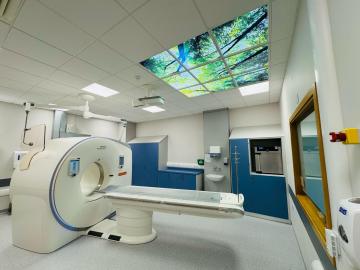Computed Tomography (CT) Colonography Scan
A computerised tomography (CT) scan is a non-invasive medical test that uses X-rays and a computer to create detailed images of the structures inside the body, including the internal organs, blood vessels and bones.
Your Doctor may refer you for CT Colonography if you are suffering from any colonic symptoms including rectal bleeding, weight loss, abdominal pain or change in bowel habit. CT Colonography can also be performed as part of a screening programme, in particular, if you have a family history of colon cancer.
A referral letter from a consultant or GP is required before booking any diagnostic investigation.
-
You will be provided with detailed instructions by the Radiology team as to how to prepare for this scan. (? insert link to CT Colonography Preparation instructions)
-
You will be asked to change to a low fibre diet 2 days prior to the examination.
-
You will be asked to follow a regime using laxatives to empty the bowel on the day prior to the test.
-
If you are on any medication, take these as normal. Please bring a list of any medications you are taking with you on the day of your scan.
-
For CT Colonography scans, an injection of a contrast agent into a vein in your arm may be necessary to help obtain a clearer picture of the area being examined. This injection very rarely causes any adverse effects but do tell the Radiographer if you have any allergies, kidney problems, high blood pressure, gout or diabetes as special arrangements may need to be made.
-
Women of childbearing age (12-55) should inform our staff at the time of making their appointment if there is any possibility that they are pregnant. CT scans aren’t usually recommended for pregnant women unless in the case of an emergency.
- You will arrive at the Radiology Department and a member of the clerical team will check you in for your appointment.
- A Radiographer will then bring you to the Preparation Area where you will change into a gown for the scan. A small needle will be placed in your arm through which the contrast agent can be administered.
- The radiographer will bring you into the CT scan room and explain the procedure to you. The Consultant Radiologist will then come into the scan room. They may give you an injection of a medication called Buscopan which is used to help ease any abdominal cramping associated with the test. The Consultant Radiologist will then place a fine tube into the back passage (rectum) and air will be gently insufflated into the bowel. You will be asked to turn in a few different positions in order to disperse the air around the bowel completely. Once the bowel is sufficiently inflated using the air, the Radiographer will position you within the donut/ring shaped scanner and take a series of images of the abdomen.
- Your Radiographer will operate the scanner from behind a window, and he or she will be able to see, hear and speak to you during the procedure.
- It can take several minutes to complete the scan and it’s important to lie very still during the process. At certain points during the scan you may be asked follow breathing instructions such as to hold your breath or to swallow. The Radiographer will inform you of the breathing instructions and practice them with you before the scan begins.
- The test is very well tolerated by the majority of patients with only minor cramps reported. Most of the time the actual CT scanning takes less than a few minutes. However, you can expect to be in the Radiology Department for up to 1 hour.
- Once the CT scan is complete, the Radiographer will remove the tube from the back passage, remove the cannula from your arm and assist you off the table.
- If you have been given an injection of contrast agent, you will be advised to drink additional water for the remainder of the day and to avoid items that may dehydrate you such as tea, coffee or alcohol.
- If you have received an injection of Buscopan, it can give you slightly blurred vision. This usually wears off 20-30 minutes post injection.
- You will then be allowed return home or to your ward. The images will be reviewed by a Consultant Radiologist. The Radiologist will send the report to your referring doctor.
Consultant Radiologists
Consultants who perform this service
How to get in touch
Contact information
CT Colonography Contact
GP Referral information
Phone: (01) 263 8030
Email: Radiology@svph.ie
Healthlink e-referrals
Please ensure to include:
-
Patients Full Name
-
Patients Date of Birth
-
Patients Address
-
Specific CT scan required
-
Clinical Information/Reason for referral
-
GP Signature and MCN
-
Date of Referral
CT’s are available by appointment only





